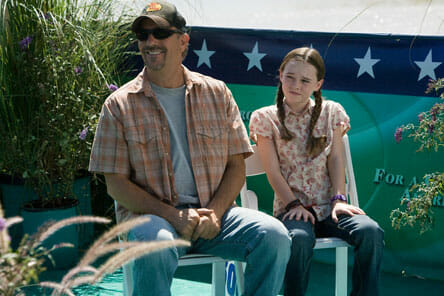
Release Date: August 1
Director: Joshua Michael Stern
Writers: Jason Richman, Joshua Michael Stern
Cinematographer: Shane Hurlbut
Starring: Kevin Costner, Madeline Carroll, Molly Johnson, Kelsey Grammer
Studio/Run Time: Walt Disney Studios, 100 mins.
More often than not, when a Hollywood film talks about sticking to principles, it reveals its true colors in the final act with a bait-and-switch. Case in point, a piece of milquetoast called Swing Vote.
A presidential election is afoot, and on the big night a voting machine in the tiny town of Texico, New Mexico, produces an error. The law says this gives the affected voter the right to recast his ballot in a reasonable amount of time—say, 30 days, for drama’s sake. That voter is Bud Johnson (Kevin Costner), a drunken loser and the father of a brilliant (we’re told) daughter. Mom is absent but frequently alluded to. Perhaps there’s a story there, maybe a real heartstring-tugger.
Well, it turns out the entire election has come to a dead heat, and New Mexico will need to break the tie, which means Bud will single-handedly decide the next president of the United States. (Chris Matthews and James Carville explain this improbability on the televisions that hang over Texico’s bars, playing themselves for the umpteenth time because, surprise, pundits are for hire.) Candidates, lackeys and media hounds quickly descend upon Bud’s home, and the wooing begins.
There’s a point in the middle of Swing Vote when this premise could have become a sharp satire with nasty incisors, and for a few minutes, I almost thought it might. These candidates turn on a dime to sweet-talk a man who doesn’t even know who’s running. Take him fishin’ and he’s yours. Promise him the moon if he wants it. If Bud really represents apathetic voters, then the promises made in the campaign’s last throes represent the national id in all its grotesquery.
But that’s another movie. In this movie, the voting machines sound like Tinkerbell when you insert your ballot, a Spielbergian sense of wonder in the glow of democracy. In this movie, Bud turns over a new leaf and patches things up with his frustrated daughter who helps him cram for the big decision. They bond. The needs of poor people are attended to in some vague way. And a drippy speech saves the day, fading out apathetically at the point when the filmmakers realize they’ve painted themselves into a corner.
One day, Bud’s daughter, sweet, sensitive and principled Molly Johnson, sits across the desk from a slimy campaign manager trying to win her father’s vote. He’s never lost an election, but Molly reads him the riot act for his soulless politics. She seems to be the heart of the film, but she’s merely a decoy. On the desk in front of her is a juice box whose logo is so prominent—she even punctuates her speech with a sip from its straw—that a still from this scene would look like an advertisement. Which, of course, it is. With no apparent irony, the movie is a series of ads for juice boxes and courier services and a certain fishing superstore, and though it preaches political engagement, it hopes very much to have an audience full of Buds who won’t mind when it ambles lazily into the closing credits having taken a stand for nothing whatsoever. Principles might alienate advertisers.